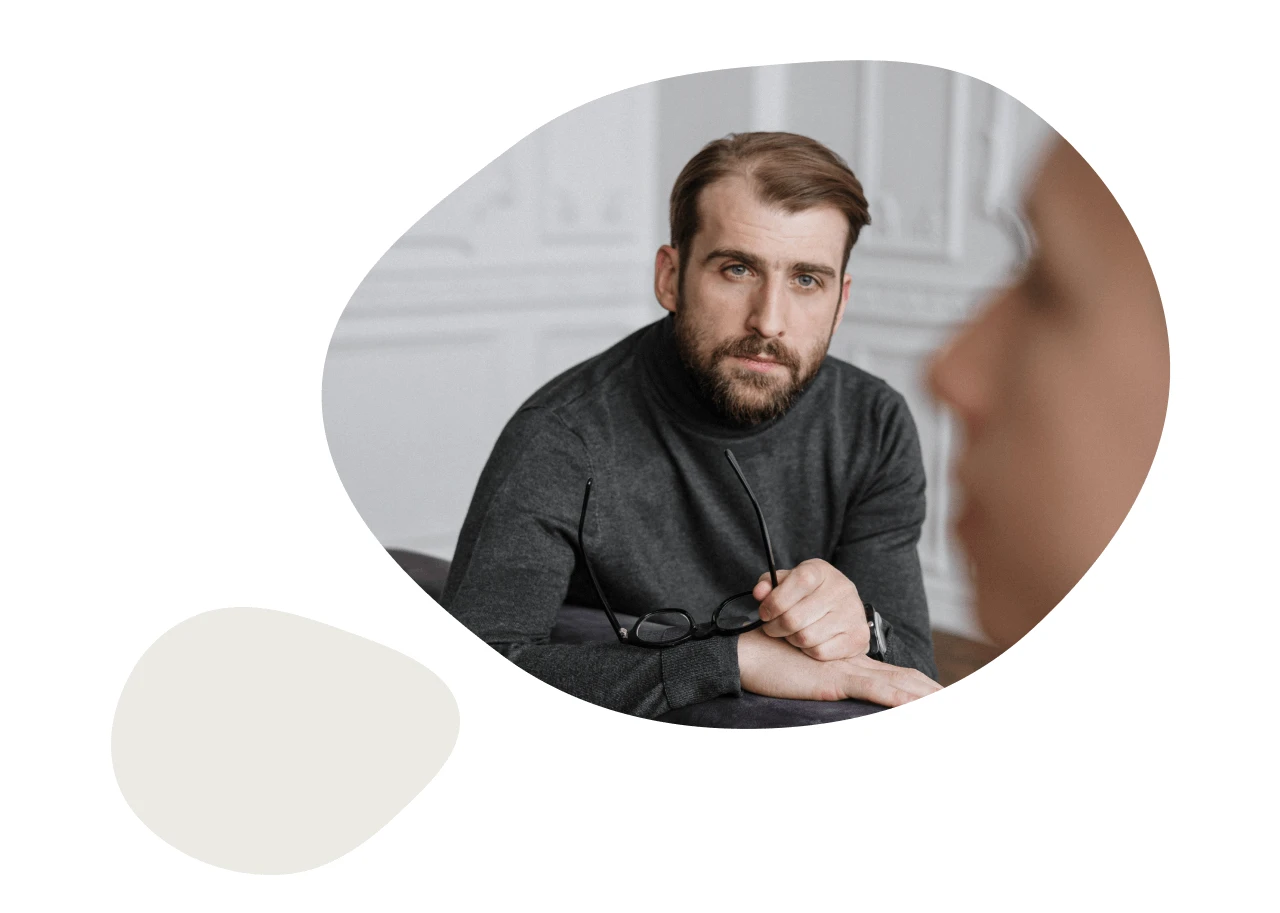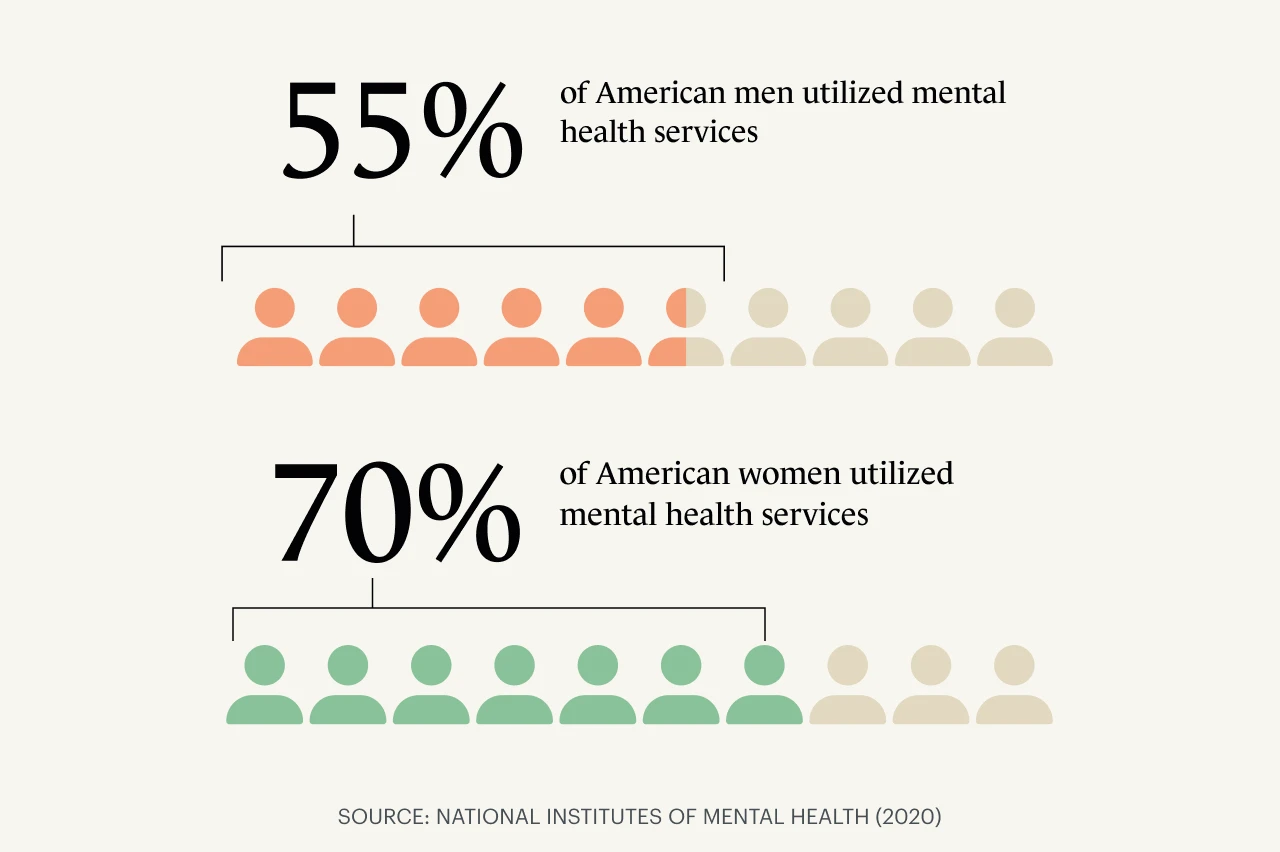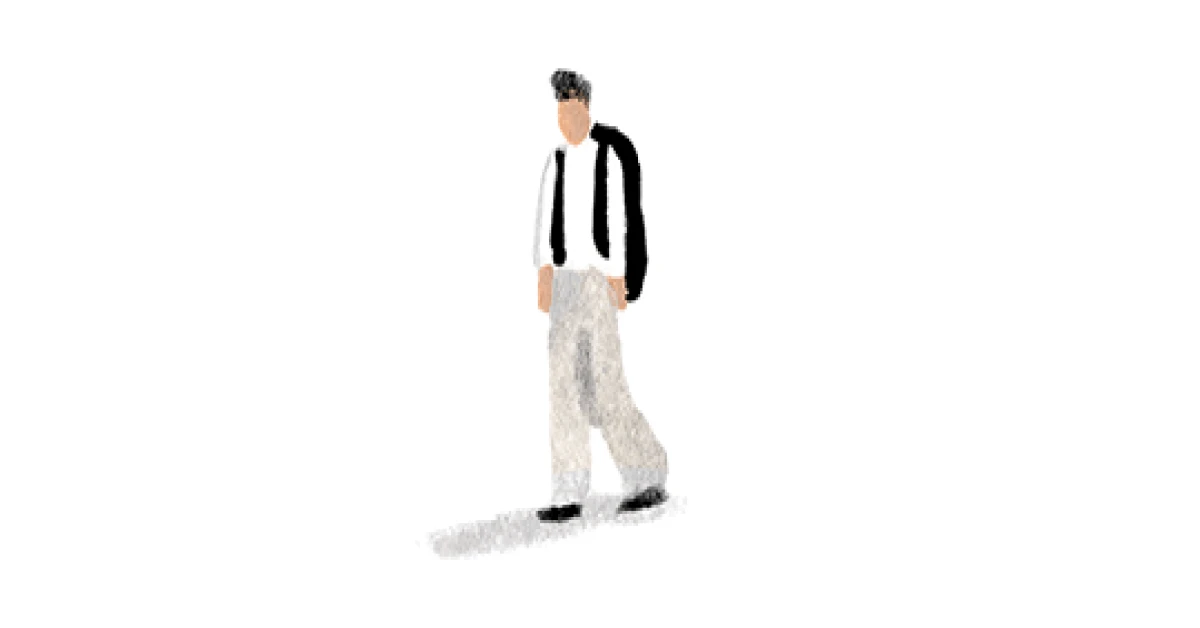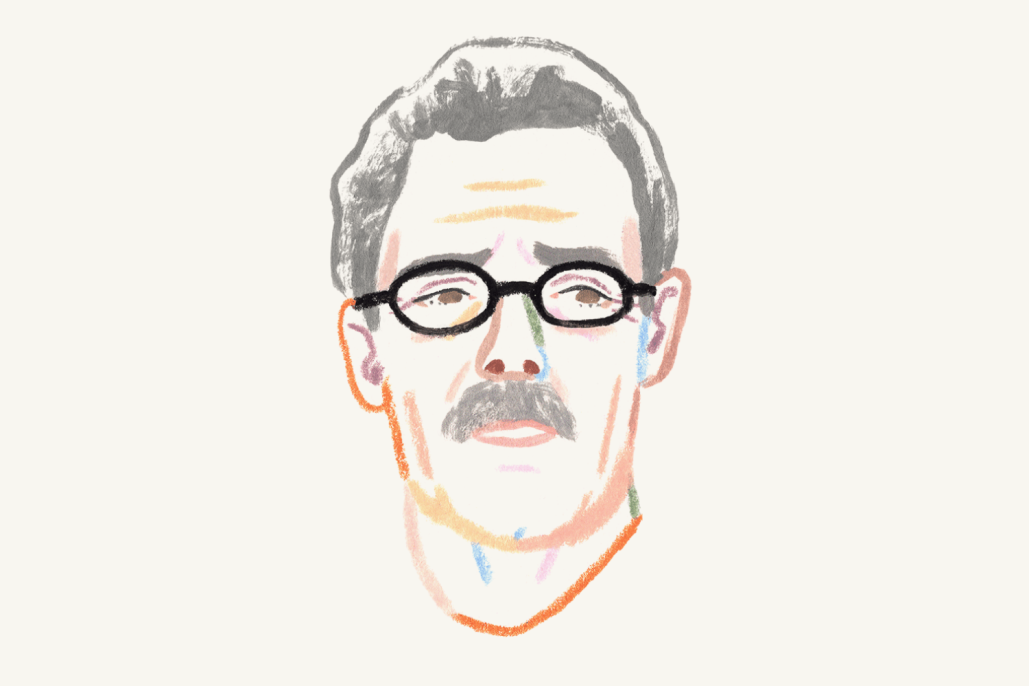What do men think about therapy and mental health?
Why is men’s mental health important to prioritize?
And, what’s the stigma around men and mental health?
Let’s take a look.
“I feel like this is something I can only tell another man,” my male therapy clients often say, especially if it’s their first time in therapy.
What’s the stigma around men and mental health?
My identity as a white, straight male therapist means I am frequently intersecting with the various identities of my patients.
However, one intersection that isn’t discussed as much is the positive impact a male therapist can have on a male client, especially if that client has expressed a strong preference to see a male therapist.
The lack of men in mental health professions may be among several contributors to the reality that less American men access mental health care.
According to the Council on Social Work Education (CSWE)’s findings from its 2019 survey of social workers completing their master of social work (MSW) degrees, 90% of new social workers are women.
The lack of men working in mental health may be among several contributors to the reality that less American men access mental health care.
Such a stark gender imbalance within the profession can create a potential roadblock for men seeking therapy and counseling, simply due to the potential challenge men seeking mental health support may experience in finding a male therapist.
While a female therapist may indeed provide the same quality care as a male therapist, patient preference for seeing a therapist who may reflect certain aspects of their overall identity may help expedite the therapeutic bond necessary for effective treatment, as was mentioned in a 2021 study.
James*, who asked that we refer to him with a pseudonym, told me he sought out a male therapist because he says his identity as a male “has been a big point of therapy” as a heterosexual male who had survived being sexually assaulted by another male.

Men and mental health services and therapy usage in the U.S.
According to the National Institutes of Mental Health (NIMH), in 2020 only roughly 55% of American men utilized mental health services, compared to roughly 70% of women.
Pulling from my experience working with male clients, a common pattern I’ve noticed among men entering therapy for the first time is that they feel unable to talk about their issues with their significant others, friends, or family.
When I ask them why they feel that way, they often mention that men shouldn’t express “weak” emotions—like feeling depressed or having anxiety—and that doing so might push others in their life away.
Usually, what leads men to therapy (and to me) is that those feelings eventually overwhelm them and cause damage in their personal lives, such as the end of a romantic relationship, being fired from a job, alienation from family, trouble with friends or co-workers, or other equivalent major negative life events.
And these events can cause depression in men as well.
“There was a long period of my life where I thought that any sort of mental health care was for people who had something ‘wrong’ with them,” says Chris*, a man who has been in therapy a few years.
Unfortunately, this opinion many men hold around mental health care is not uncommon.
“There was a long period of my life where I thought that any sort of mental health care was for people who had something ‘wrong’ with them,” a male client told me.
The cultural component around men seeking mental health care must also be discussed.
“In the past, my experience is that men usually came in for therapy because a partner or spouse encouraged them to, they were asked to seek help by their employers, or they were mandated by the courts to seek help,” says Monarch therapist Ellen Biros, MS, LCSW, C-PD.
Promoting the idea of seeking mental health care as an empowering thing to do, rather than as a weakness, is necessary if we want to see men more freely choose to pursue mental health support and treatment.
While it’s never too late to seek treatment, I often think about how much easier it would have been for my clients if they had felt more empowered to reach out for and find help before they reached “rock bottom.”

Mental health issues affecting men
When it comes to major mental health issues, it’s arguable that we are in the midst of a nationwide suicide crisis for men.
American men are nearly four times as likely to complete suicide compared to women.
Suicide is the eighth leading cause of death mong American men—and it’s in the second leading cause of death for White males age 15-34.
Death by suicide is not the only gender difference in mental health, as men are more likely to show symptoms of aggression, impulsivity, substance abuse, and other emotions that tend to be displayed outwardly as antisocial behaviors, according to the American Psychological Association (APA).
Over 43% of people in America’s state prisons have been diagnosed with a mental health disorder.
In America, a country that has had the highest incarceration rate since 2002, men make up over 90% of the current prison population, with an imprisonment rate 14 times higher than women, according to a 2010 article in the U.S. Department of Justice.
Data from the Bureau of Justice Statistics’ 2016 Survey of Prison Inmates shows that over half of people in America’s state prisons reported some indication of a mental health problem, and over 43% have been diagnosed with a mental health disorder.
A 2022 study found that U.S. communities with a greater amount of mental health services have significantly lower incarceration rates.
Compared to women, men tend to have fewer friendships.
The study’s authors concluded that counties with greater accessibility of mental health care services are able to respond to a range of mental and behavioral health issues without relying on incarceration.
Our failure as a society to de-stigmatize mental illness is resulting in generations of men being locked behind bars at astonishing rates.
Future negative repercussions from being in prison are complex and many.
The COVID-19 pandemic’s impact on men’s mental health
The impact of COVID-19 on men’s health cannot be overstated and responses to the pandemic often unintentionally impacted some of the supports men struggle with in regard to mental health.
COVID-19 seems to have been particularly harmful to male mental health by increasing a certain percentage of men’s social isolation.
Compared to women, men tend to have fewer friendships and the friendships they do have are often based around a hobby or activity. Unfortunately, during periods of shelter-in-place and quarantine, most in-person social activities and hobbies were obviously limited or curtailed.
Research has also found that men spend less time than women on phone and video calls.
These communication methods often times were the only way to connect with friends and relatives during particular periods of the pandemic.

With men already struggling compared to women with forming social circles which support good self-care for mental health, the COVID-19 pandemic seems to have been particularly harmful to male mental health by increasing a certain percentage of men’s social isolation.
Findings from a large nationwide survey conducted in 2020, found that "older people and men had the greatest increase in the prevalence of social isolation."
COVID-19 also hospitalized men in larger numbers than women for severe cases needing intensive care unit admissions. And some researchers expect that we will start seeing higher rates of post-traumatic stress disorder (PTSD) triggered by the experience of being hospitalized and often put on a ventilator.
How to get more access to therapy and mental health services for men
One action that may contribute over time to more men accessing therapy and a positive impact on American men’s mental health is finding ways to encourage more men to enter the field of mental and behavioral health at all levels.
Increasing accessibility and availability to therapy and mental health care, in general, can also have an impact on increasing and improving men’s mental health options.
The increased availability of telehealth and teletherapy options may make it easier for those who live in more remote areas or who are juggling a busy schedule to fit in counseling and therapy sessions.
Online directories of mental health professionals empower therapy seekers to sort and view clinician profiles by areas of specialty and location.
These types of searchable directories and clinician communities may also help men to find a male therapist accepting new clients and/or a therapist who specializes in the area of men’s issues.

The Monarch directory, by SimplePractice for example, allows therapy seekers to view clinician profiles of therapists and counselors nearby as well as their specialties and interests. This can help them to find a therapist aligned to their needs.
Finally, for those who live in states with a lack of therapists with availability to accept new clients, some U.S. states have reciprocity agreements with other states that allow their licenses to be recognized, so they can legally practice therapy in other states.
Increasing programs like this could be one way to ensure continuity of care, and allow male clients seeking male therapists to cast a wider net and find a therapist who fits their needs.
The obstacles for men to receive mental health care can’t be dismissed and should be a goal of our profession to dismantle.
That said, these obstacles are not insurmountable.

Many therapists and counselors went to social work school, as I did.
I often refer back to our code of ethics that states:
“The primary mission of the social work profession is to enhance human well-being and help meet the basic human needs of all people, with particular attention to the needs and empowerment of people who are vulnerable, oppressed, and living in poverty.”
As therapists, we must ask ourselves the uncomfortable question if we are living up to those values with the decisions we make around offering a sliding scale when we set our pricing and whether or not we accept different types of insurance.
Through considering these types of accessibility questions, as providers, we may be able to help create more equitable and accessible services for the clients we serve.
How men can find male therapists and mental health support
A good first step can be searching for therapists on the Monarch Directory by SimplePractice.
You can filter by speciality to find a therapist who specializes in men’s issues near you. You can even filter by therapists who take your insurance and those who offer free 15-minute consultations.
Another approach you might try is to reach out to a local private practice or clinic, even if their listed page only shows providers who identify as women.
Speaking from experience, therapists don’t work in isolation and often have relationships with other practitioners either through attending professional development programs together or having worked at the same clinic.
I never hesitate to refer a client to a colleague if I think they would be a good fit and I believe most other providers have a similar philosophy.
If you are a man hesitant about starting therapy and feel that a male therapist would be more comfortable for you, you won’t cause harm or offense by asking a therapist or clinic if they can refer you to a male therapist or counselor who they know personally.
If your ability to find affordable therapy or mental health support is a concern, here are some tips on how to find affordable or low-cost therapy options.
READ NEXT: Why Aren’t More Men in Therapy?
Need to find a male therapist or a therapist who specializes in men’s issues? Check out the Monarch Directory by SimplePractice to view therapists and counselors near you as well as therapists who specialize in men’s issues.



